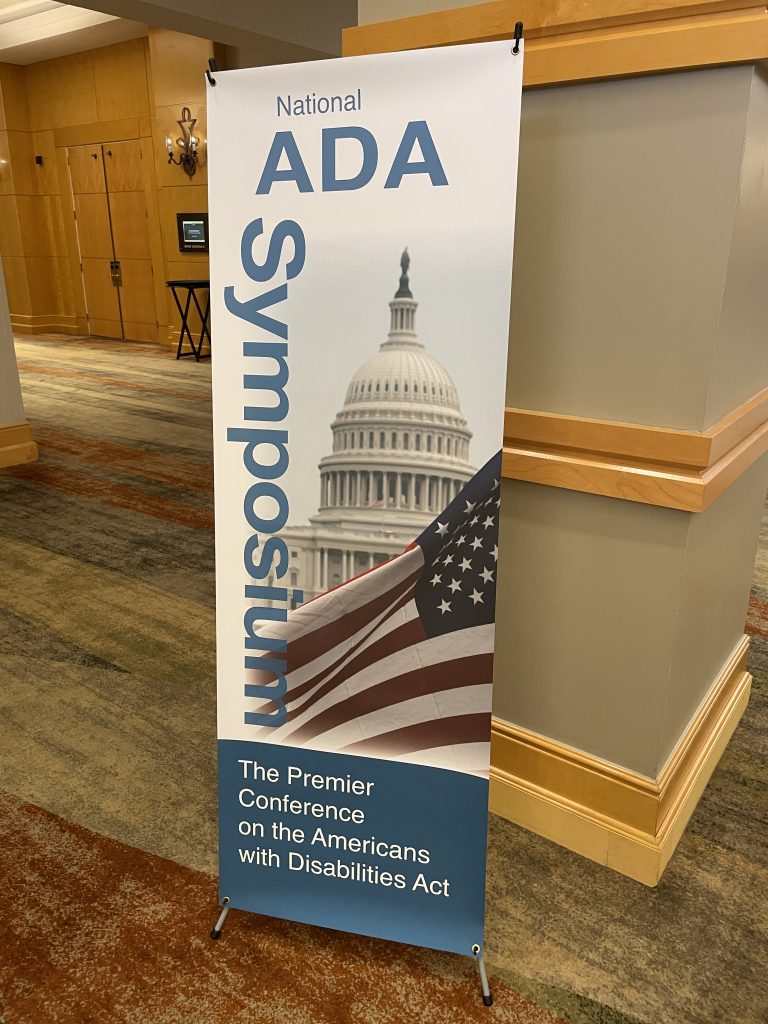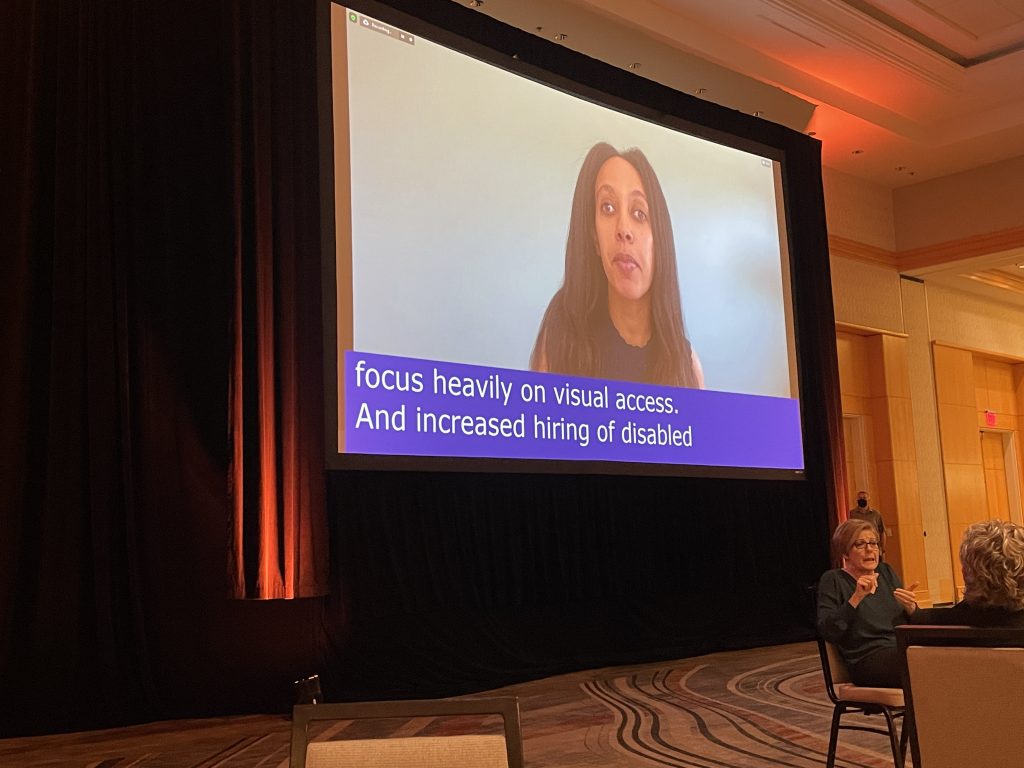Just as the country celebrated the 31st anniversary of the signing of the Americans with Disabilities Act (ADA) on July 26, the National ADA Symposium kicked off in Phoenix.
Running July 26-28 at the JW Marriott Phoenix Desert Ridge Resort & Spa, the symposium returned after being canceled last year because of the novel coronavirus (COVID-19) pandemic. A project of the ADA National Network, the annual symposium is coordinated and hosted by the Great Plains ADA Center, along with this year’s co-host the Pacific ADA Center from California.

Although the symposium’s attendance of 424 was a little more than half as many people as before the pandemic, Julie Brinkhoff, director of the Great Plains ADA Center, says it was wonderful to be back to an in-person event.
“You can do a lot online, you can do a lot virtually, but there’s a certain level of communication and networking that really only happens in person at events like this,” Brinkhoff says.
The symposium featured 56 breakout sessions and a keynote address on topics ranging from basic ADA guidelines and the role of an ADA coordinator to ADA applications in architecture, employment, health care, communications, sports programs and more. There will be additional sessions offered during a virtual symposium that runs Aug. 2-5.
Brinkhoff says even though the in-person event was canceled last year, individual sessions were offered through webinars held twice a month for three or four months that were hosted by the Great Lakes ADA Center, Region 5. Brinkhoff says she believes the virtual sessions may continue in some format to accompany the in-person symposium.
“It’s a model that we’re definitely going to examine and look at because it seems to be a highly effective model,” she says. “Between the two conferences, the on-site and the virtual, we have 1,200 registered, so there’s obviously some success there.”
The symposium also marked the 30th anniversary of the ADA National Network.
“I would like to think the ADA National Network has been instrumental in some of the changes in attitudes and barrier removal that has opened up a world where we can expand opportunities to everyone,” Brinkhoff says. “And I know it’s been said by other people besides myself that ADA National Network has been instrumental in implementing the ADA throughout the United States, and both for people with disabilities knowing their rights and responsibilities but also working with state and local governments and businesses and health care and education, just across society. We’ve provided information and education and products and services about the ADA so people have that information, and we try to do it in a way that’s targeted to user needs and is user-friendly.”
A learning opportunity
This year was the fourth time attending the symposium for Tim Valentin, Paralyzed Veterans of America (PVA) Minnesota Chapter’s legislative director.
“I think it’s very important that PVA is here to gain further knowledge of all the changes that are coming through on the ADA and to keep up to speed on what’s going on in the ADA,” he says. “That way we can push legislation to help not only us, but the ADA, help it further accessibility for everybody.”
In addition to gathering education credits to become a certified ADA coordinator, Valentin also enjoys the chance to learn the latest accessibility guidance at the symposium each year.
“There’s never enough time in one year to take all the classes, so you’re always taking different classes every year, so you’re always continuing to learn,” Valentin says. “So, what I’m taking away this year is more education, higher education as far as accessibility goes. This year, more focus is more on sporting events and sports. It seems like that’s where everything is starting to go, where there’s more sporting events and more sports teams starting up, and it’s a way to get people out. They don’t have to be a professional to participate. They don’t have to be a high school pro baller or college sports player. Everybody’s more equal in a chair.”
He says his favorite session was one on developing an adaptive sports program.
“It’s more of how to start up a program in your area so people know just because you’re disabled doesn’t mean you have to stay locked in,” Valentin says. “And you can get out. You can make the community more aware of what’s going on and make the community more accessible through sports.”

Another attendee was Katie Shelley, who recently became the manager of access initiatives at the Toledo Museum of Art in Toledo, Ohio.
“Especially with my position being so new, I wanted focus on areas I might not be as familiar with but will need to know about in regard to making them more accessible, for example, hiring practices, also effective communication and things of that nature. Customer service,” says Shelley, who has cerebral palsy. “I know a lot about physical accessibility, but I wanted to learn more about different elements.”
Reflecting on the ADA’s 31st anniversary, Shelley says she feels fortunate that disability rights advocates fought to make it possible for her to grow up in a world with reasonable accommodations and equal access, but the ADA is the minimum requirement and there is more work to do to remove barriers and ensure civil rights for people with disabilities.
“I feel as though there are still things we can do to go above and beyond the ADA and truly make things more inclusive and accessible and not just focus on the minimum requirements that the Americans with Disabilities Act sets forth, but really focus in the future on more inclusion and access for people with disabilities to really feel as though they belong in their communities and they are equal participants in community life,” Shelley says.
Addressing ableism
That continued fight for inclusion was echoed by keynote speaker Haben Girma, who gave her presentation via Zoom video conferencing.
Girma, a disability advocate and the first deaf-blind person to graduate from Harvard Law School, spoke candidly about her fight against ableism. To communicate with the audience, she utilized a hearing interpreter, who typed in questions that Girma then read with a BrailleNote computer.
“The ADA is a tool to try to address ableism, but we need more,” Girma says. “The burden often too much falls on disabled people’s shoulders to fulfill the ADA’s promise, and we need more people joining us in trying to end ableism.”
Girma says shifting how people think about disability is one way to stop ableism. She likes to define disability as an opportunity for innovation.
“If you can’t do something one way, find another way to do it,” she says. “And sometimes, that alternative technique benefits disabled people and non-disabled people and changes society. There are lots of examples of disabled people coming up with solutions that [impact] the greater community.”
Girma says she began advocating simply to access things everyone should be able to access. She shared an anecdote about her first undergraduate semester at Lewis & Clark College in Portland, Ore. Although she had textbooks and exams in Braille, the cafeteria menu wasn’t provided in Braille. She asked the cafeteria manager if it could be provided in Braille or if it could be posted online or emailed so she could use assistive technology to read it.
“And the manager says to me, ‘Listen, we have over 1,000 students. We don’t have time to do special things for students with special needs.’ Just to be clear, eating is not a special need,” Girma says. “It’s a myth that there are two kinds of people, dependent and independent. It’s a myth. All of us are interdependent. Many of you like coffee. Very few of you grow your own coffee beans. You depend on other people to grow the coffee beans. And that’s OK, as long as we’re honest about the fact that all of us are interdependent. Historically, the disability community has put a huge emphasis on independence, and I feel like that’s actually harmful. The goal should be interdependence, recognizing that there are multiple ways to help each other to do things on our own, and if you need to depend on other people sometimes, that’s OK, too. That’s part of the social, human experience.”
She says her cafeteria troubles went on for months. She talked to friends, advocates and did her own online research and found out about the ADA. She went back to the cafeteria manager and said she would take legal action if access to the menu wasn’t provided. The next day, the manager apologized and promised to make the menus accessible. The next year, a new blind student came to the college and had immediate access to the menus.
“I’m telling you, when I advocate, it helps all the students who come after me,” Girma says. “There were so many people who said, ‘It’s just a menu, big deal.’ Our community is full of these small barriers that we’re told to tolerate. They add up over time. When you take the time to address a small barrier, you build up the skills to master larger obstacles.”
Even at Harvard Law, Girma struggled with ableism. She described a career networking event at which an attorney only spoke to her interpreter and called her “inspiring.”
“A lot of non-disabled people call disabled people ‘inspiring’ when they feel awkward or uncomfortable or don’t know what to say,” Girma says. “Because of experiences like this, a lot of disabled people don’t like being called ‘inspiring.’ I’m OK being called ‘inspiring’ if it’s connected to an action.”
In Girma’s closing remarks, she challenged attendees to think about an action they could take in their personal life or in their organizations to make the community more inclusive.
“If you’re going to reach a future that’s fully inclusive and accessible to everyone, we need more people joining us, disabled and non-disabled, to call out ableism, whether it’s a small issue or a large issue,” she says.
For information on the ADA National Network, visit adata.org.


